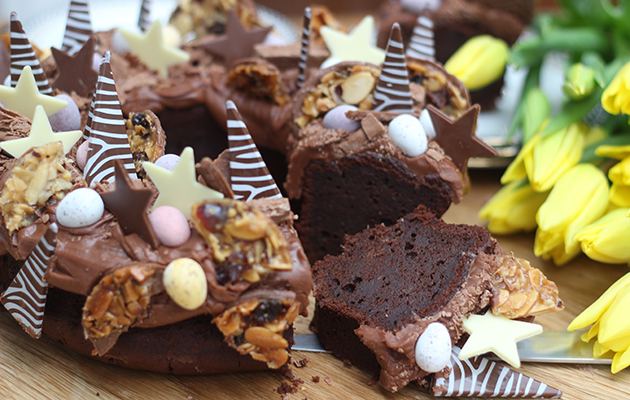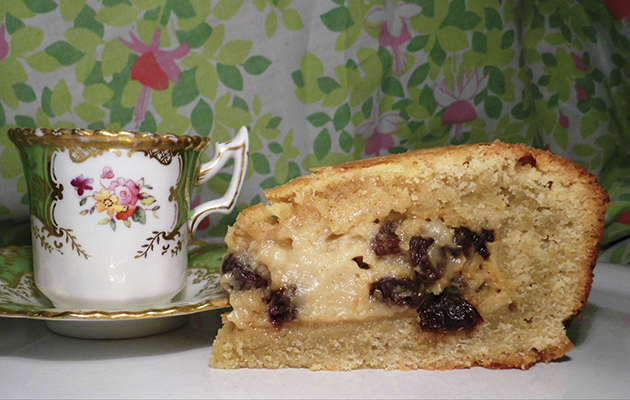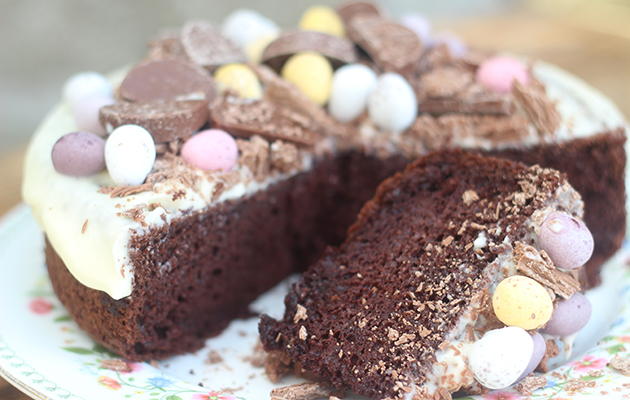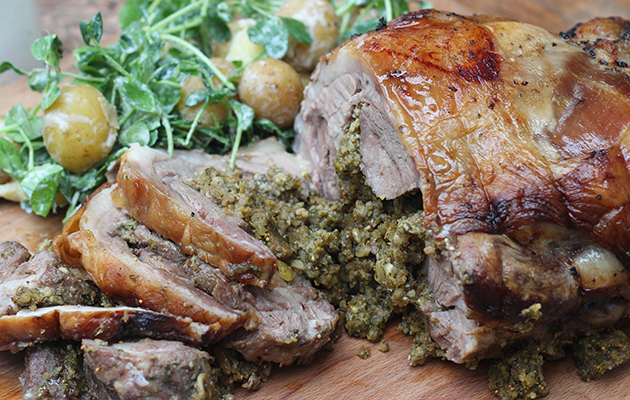Our top pick of Easter dishes for you to try this year.
The Field’s top six Easter recipes
Easter is such a super time of year: a ray of sunshine (hopefully literally) after the restraint of Lent and the grey months of winter. It is a time to make the most of not just delicious seasonal ingredients but also some indulgent treats, such as those found in our selection of the most tempting Easter eggs. If you’re planning an egg hunt, to be sure to read our guide to organising a family (and labrador friendly) Easter egg hunt. In the meantime, you can start planning for some celebratory feasts with our top six Easter recipes.
Chocolate, ginger and orange Easter cake
There are ways to consume cocoa this Easter without unwrapping yet another chocolate egg. Put aside time this long weekend to bake Philippa Davis’ chocolate, ginger and orange Easter cake. Simple to make, loaded with chocolate and perfectly moist, make this your new Easter Sunday staple. Perfectly moist and loaded with chocolate, this is a great party piece. But be warned: it’s super rich so serve in small slices.

Serves 10
- 24cm/12 cup/9½in wide Bundt tin
Tin prep
- 1 tbsp soft butter
- 2 tsp coco powder mixed with
- 2 tsp icing sugar
Cake batter
- 180g soft butter
- 380g soft brown sugar
- 200ml buttermilk
- 5 eggs
- 1 tsp vanilla extract
- 2 oranges, zest only
- 2 tbsp ginger cordial
- 200g plain flour
- 1½ tsp baking powder
- 75g cocoa powder
- 1 tsp ground ginger
- 170g 70% chocolate, in small pieces
- 170ml just-boiled water
Icing
- 100g icing sugar
- 50g butter
- 50g melted chocolate
- ½ tsp vanilla
- 15ml-30ml whole milk
To decorate
- A generous selection of chocolate, which could include chocolate bars, eggs and biscuits.
Basque cake with Easter spices
Somewhere between a cake and a tart, this Basque cake with Easter spices is made from sweet shortcrust pastry dough filled with pastry cream before being baked like a cake. In its basic form it’s a classic, but I’ve given it an Easter recipe angle with some of the spices you might expect to find in a hot cross bun. Best served warm, this Basque cake with Easter spices can be eaten with cream as a dessert with a difference or with a shot of espresso as a teatime treat. Try Rose Blackett-Ord’s recipe.

Fills 8in cake tin
For pastry
- 200g (7oz) butter
- 200g (7oz) sugar
- Zest of 1 lemon
- 3 eggs
- 300g (11oz) flour
- 2 tsp mixed spice
- 50g (2oz) almond flour
- Salt
- A little beaten egg to glaze
For the pastry cream
- 400ml (14fl oz) milk
- 4 cardamom pods
- 1 cinnamon stick
- 4 cloves
- 1⁄4 tsp grated nutmeg
- 90g (31⁄2oz) sugar
- 3 egg yolks
- 60g (21⁄2oz) flour
- 150g (5oz) raisins, soaked in
- 1 tsp rum
To make Basque cake with Easter spices, first cream the butter, sugar and lemon, then beat in the eggs.
Sieve in the flour and mixed spice, add the almond flour and salt and mix into a dough (flour your hands and work surface).Form it into a flat disc, cling film it and refrigerate for two hours.
In the meantime, gently heat the milk with all the spices until steaming, then leave in a warm place for five minutes to infuse. Heat it back up until it steams while whisking the sugar into the egg yolks until they are pale and creamy. Sieve the hot milk and whisk it into the yolks a little at a time.
Pour the mixture back into the milk pan, whisk in the flour and bring slowly to a boil, whisking until thick and smooth. Put cling film directly on the surface and allow to cool.
Beat the raisins into the cooled pastry cream. Roll out two circles of dough, one slightly larger than the other. Press the larger circle into the buttered cake tin (it should extend up the sides).
Fill the middle with pastry cream and top with the smaller circle, pressing the edges together until sealed. Brush a little beaten egg on the top and mark in a criss-cross pattern with a fork.
Bake in the centre of a pre-heated oven at 180°C/350°F/Gas Mark 4 for 35-45 minutes. The top should be golden-brown and the pastry cooked through. Serve warm.
Slow cooked shoulder of mutton with roasted radishes, boozy potatoes and burnt butter black olive salsa verde
Hogget or mutton make great, and much more flavoursome, alternatives to spring lamb for Easter. Try something different with Philippa Davis’ slow cooked shoulder of mutton with roasted radishes, boozy potatoes and burnt black olive salsa verde.

Serves 8
- 2.6kg mutton (or hogget), shoulder bone in
- 4 small red onions, peeled and finely chopped
- 8 sticks celery, finely chopped
- 8 cloves of garlic, peeled and finely chopped
- 2 tbsp finely chopped rosemary
- 100ml dry white wine
- 200ml light game stock or water
- 200g radishes
Burnt butter salsa verde
- 50g parsley, finely chopped
- 100g pitted black olives, finely chopped
- 2 tsp finely chopped capers
- 8 anchovies, finely chopped
- 4 tsp lemon juice
- 2 tsp red wine vinegar
- 200g unsalted butter
Boozy roast potatoes
- 1.6kg roasting potatoes, washed and cut into 2cm cubes
- 2 tbsp finely chopped rosemary
- 100ml olive oil
- 200ml dry white wine
Preheat the oven to 230°C/450°F/Gas Mark 8.
Mix the red onions, celery, garlic, rosemary, wine and stock together in a roasting tin, place the meat on top and season everything.
Cover with a sheet of baking paper then tightly seal with foil.
Roast for 30 minutes, turn the heat down and cook for a further 3 hours or until the meat is tender.
When the meat is tender take off the parchment and foil, scatter over the radishes and roast for a further 30 minutes.
Rest for half an hour loosely covered before serving.
For the boozy potatoes, in a bowl, toss all the ingredients together. Pour into a roasting tray lined with baking paper and cook in the oven at 180°C/ 350°F/Gas Mark 4 for 1 hour, turning once.
For the burnt butter salsa verde, mix everything together in a bowl, except for the butter.
In a small saucepan, gently melt the butter on a low heat. When you start to see golden flecks appear in the bottom of the pan stir gently for about 15 more seconds then pour it into the bowl with the other ingredients and stir well.
To serve, pile the potatoes, radishes and the veg from the mutton roasting tray onto a serving platter and top with the meat.
Drizzle with the salsa verde and carve in thick slices at the table.
Chocolate and orange Easter chiffon cake
Chocolate is essential for the long Easter weekend, but it doesn’t have to come in egg form. Philippa Davis’ chocolate and orange Easter chiffon cake requires extra time and care to a standard chocolate cake – but the result is tender, moist, light and not too sweet. This can be baked in a traditional chiffon tin or a deep aluminium round one. Do not grease or line the tin as the batter needs to cling on when cooking and cooling. Once cooked, suspend the cake upside down so it doesn’t collapse in on itself.

Serves 8
- 40g cocoa powder
- 130ml milk
- 2 tbsp crème fraîche
- 5 eggs, separated
- 90ml rapeseed oil (or sunflower)
- 1 tsp vanilla extract
- 170g self-raising flour
- 1 tsp bicarbonate of soda
- 120g caster sugar
- ¼ tsp cream of tartar
- 2 oranges, zest only
- 1 tsp orange blossom water
Icing
- 100g icing sugar
- 1 tsp orange blossom water
- 4-6 tbsp double cream
To decorate
- Chocolates – mini eggs, flakes, chocolate orange segments, etc – and whipped cream
Preheat the oven to 170°C/ 325°F/Gas Mark 3. In a small bowl, whisk together the cocoa, milk and crème fraîche. In a jug, mix the egg yolks, oil and vanilla. In a large bowl, whisk the flour, bicarb and 100g sugar together. Whisk the cocoa and egg yolk mix into the flour until well combined. In a clean bowl, whisk the egg whites with the remaining 20g sugar and the tartar until stiff peak stage. In three stages gently fold into the cocoa mix.Slowly pour into an ungreased not lined cake tin then give the mixture a gentle swirl with a thin skewer (this will help get rid of air pockets). Bake on the lower shelf for 1 hour. Leave to cool suspended upside down in the tin (you can prop the edge of the cake tin up with small ramekins).Once cool, run a knife around the outside of the cake and push the cake out. Run a knife across bottom to release cake then place bottom up on your serving platter.Whisk icing ingredients together using enough cream to create a slightly runny paste then pour over cake. Pile chocolates on top and serve with whipped cream.
Chocolate chip cookies. A sweet treat for Easter
Easter requires a decent cocoa fix, but if chocolate eggs are not your thing indulge in something irresistibly moreish without being cloying. Philippa Davis’ chocolate chip cookies are perfectly crunchy and chewy, and the far superior way to consume cocoa this Easter.

Serves 30
- 250g room-temperature, salted butter
- 200g granulated sugar
- 220g soft brown sugar
- 2 medium free-range eggs
- 1 tsp vanilla extract
- 375g plain flour
- 5g bicarbonate of soda mixed with 1 tbsp boiled water
- 300g milk or dark chocolate chips or an assortment of odd ends of chocolate eggs /bars chopped up
- 1½ tsp ground cardamom
- 2 oranges, zest only
Beat the butter, granulated sugar and soft brown sugar until pale.Add the eggs and vanilla until combined, then slowly add the flour and bicarb. Do not over mix.Finally, add the chocolate chips, cardamom and orange zest.Form the dough into two logs about 5cm in diameter and chill for one hour. The logs also freeze well at this stage.Preheat oven to 200°C/400°F/gas mark 6.Line flat baking sheets with non-stick baking paper.Slice the cookie dough into 2cm-thick disks and spread the disks out onto the baking sheets.Bake for 10 minutes, then leave to cool slightly before transferring to a rack to cool completely.
Stuffed and rolled shoulder of hogget served with warm potato and creme fraiche salad: the perfect Easter joint
Spring lamb is a popular choice for the Easter table but don’t be too quick to choose your joint. Hogget, a sheep aged between one and two years, is perfectly succulent and has a more complex and interesting flavour. Philippa Davis’ stuffed and rolled shoulder of hogget with warm potato and crème fraîche salad is fantastic for feeding a crowd.

Serves 8-10
- 2.5kg deboned hogget shoulder,
- plus the bones
- 2 tbsp olive oil
- 4 sticks celery
- 2 red onions, peeled and roughly chopped
- 5 bay leaves
- Small bunch thyme stalks
- 150ml white wine
Stuffing
- 125g pinenuts, lightly toasted
- 20g tarragon, finely chopped
- 20g thyme leaves (keep the stalks for the lamb), finely chopped
- 20g mint, finely chopped
- 10g sage, finely chopped
- 1 handful washed wild garlic
- 5 garlic cloves, finely chopped
- 100g white bread, roughly torn
- 200g chopped dried figs
- 1 heaped tbsp soft butter
Warm potato salad
- 800g Jersey Royals or new potatoes
- 200g crème fraîche
- 75g pea shoots or watercress
Method
To make the hogget, first preheat the oven to 170°C/325°F/Gas Mark 3.In a food processor, blitz all the stuffing ingredients and season.Lay the shoulder skin-side down and form a stuffing log down the middle. Bring up the sides and tie up to make a roll. Rub the outside of the meat with the olive oil and season.Place the celery, onions, bay and thyme stalks in the bottom of a roasting dish. Sear the meat on all sides and place in the roasting dish with the wine and
150ml water. Cover with foil and cook for 3½ hours, basting a couple of times while cooking.Let the hogget rest for 15 minutes then strain off all the liquor, removing the fat, to serve as gravy.Remove all the string and slice the meat into thick rounds. Serve it with a jug of the cooking liquor to use as gravy and a side of new potato salad.To make the new potato salad, boil the new potatoes in salted water and drain.Lightly crush with a masher (you just want to break the skin but keep the shape) then stir through the crème fraîche with a splash of warm hogget liquor. Season and toss through the salad leaves.
If you enjoyed our Easter recipes..
Be sure to check out other delicious culinary suggestions from The Field, including the tastiest egg florentine and our guide to the best casserole dishes.




